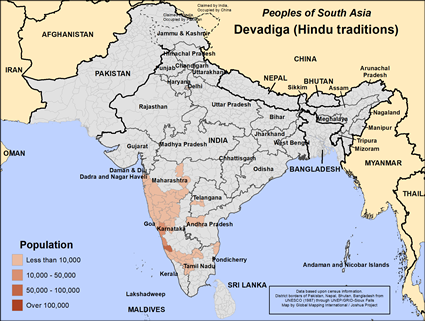Devadiga are a Hindu people who live in southwest India. Their name comes from words that mean, “servant of a god.” As their name suggests, the traditional occupation of the Devadiga was assisting Brahmins in temples as helpers and musicians. Devadiga clean and maintain the temples. They are also known for a special type of folk dance they perform. Today most Devadiga work in agriculture growing rice, wheat, lentils, vegetables, sugarcane and coconuts on their own, and sometimes on land owned by others. Devadiga follow a matrilineal system of inheritance from uncle to nephew, through their mothers. Men are the custodians of the property, but the women own the land.
It is very difficult to get a movement to Christ started when there are no Christ followers within a community. Those who take the gospel to Davadiga will need to reach their leaders, praying they will embrace the Lord and open the door for others.
Pray that a movement to Jesus would multiply among Devadiga families and communities.
Pray that God will send Christian workers to befriend and serve Devadiga families.
Ask the Lord to raise up and send out a new generation of fruitful, multiplying witnesses from among the Devadiga.
Scripture Prayers for the Devadiga (Hindu traditions) in India.
| Profile Source: Joshua Project |











